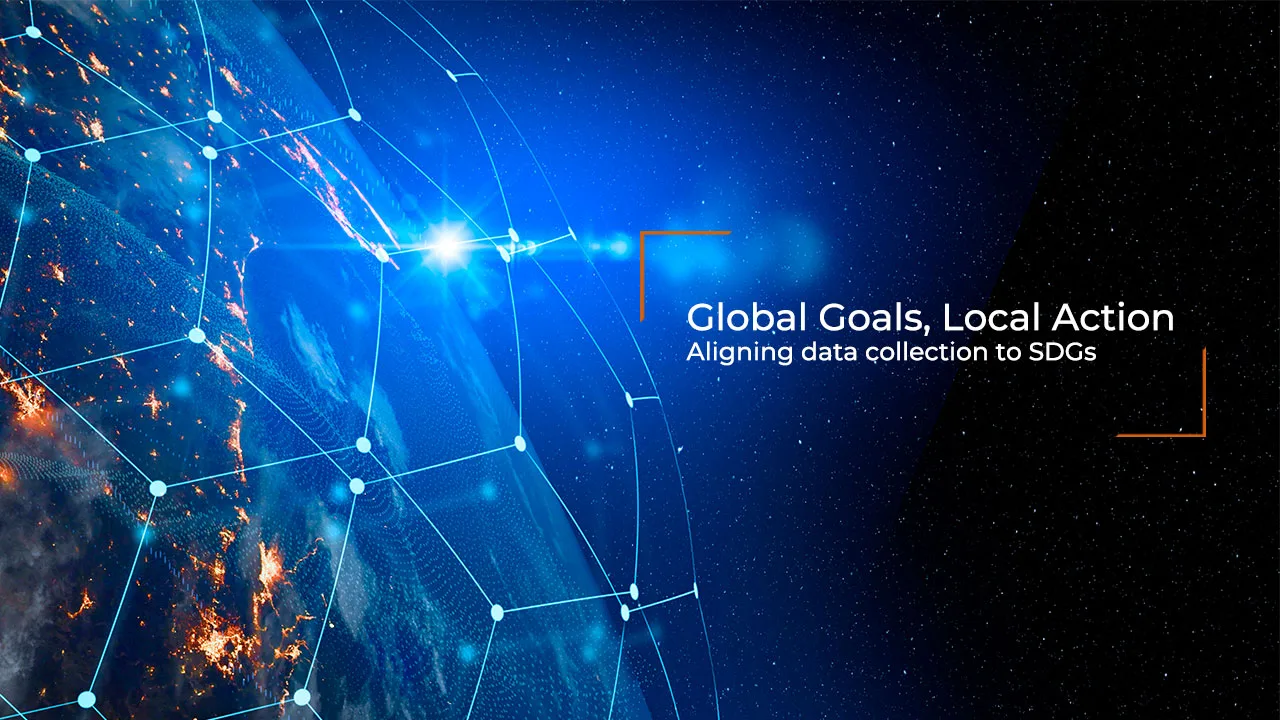As the world unites to meet the ambitious Sustainable Development Goals (SDGs) by 2030, achieving tangible results at the local level is crucial. The SDGs goals span diverse areas like health, education, climate action, and poverty alleviation. However, local contexts, unique challenges, and community-specific priorities often dictate the actual impact. To align global goals with local action, targeted data collection is essential. By gathering accurate, location-specific data, communities can participate in a transformation process that reflects their unique needs, challenges, and aspirations.
Why Local Data Collection Matters for Sustainable Development Goals
One of the biggest challenges in achieving the Sustainable Development Goals is the need for local data collection. While global metrics provide a broad framework, only granular, community-level data can reveal the true picture of progress on the ground. Communities are diverse, with unique social, economic, and environmental dynamics. Therefore, understanding these nuances through data collection enables more targeted interventions and resource allocation.
When communities have access to relevant data, they can see the specific areas where they lag behind in the SDGs goals and take steps to address these gaps. Local data helps decision-makers create interventions that truly resonate with the people they serve. They foster a sense of community ownership and accountability.
The Role of Data Collection in Tracking SDGs Goals Progress
Data collection is a powerful tool for tracking SDGs goals progress, as it provides measurable insights into how a community is advancing toward each goal. For instance, tracking data on access to clean water, education quality, healthcare, and employment can reveal which Sustainable Development Goals are progressing and which require further attention. Moreover, data collection provides transparency for communities to monitor the effectiveness of local policies and initiatives.
With accurate data collection, communities and policymakers can adapt their strategies based on real-time information. For instance, if a community realizes they’re falling behind in areas such as health or education, they can immediately reallocate resources to address these pressing issues.
Improve Community Engagement through Sustainable Development Goals
One of the most significant benefits of aligning data collection with the Sustainable Development Goals is the opportunity to improve community engagement. When communities understand the goals they’re working toward and can see the metrics of their progress, they feel more empowered to participate actively. Engaged communities are crucial for achieving sustainable change, as the local population must feel connected to the process and invested in its outcomes.
Through initiatives like local data-gathering projects, residents can be directly involved in the tracking and monitoring of SDGs goals. This level of engagement creates a sense of ownership because community members feel responsible for the success of their local projects. Engaged communities are also better equipped to hold leaders and organizations accountable which in turn makes the implementation of Sustainable Development Goals transparent and effective.
Using Data Collection to Drive Policy and Investment
Quality data collection not only helps track SDGs goals progress but also informs policy and investment. Localized data provides clear insights into community-specific needs, allowing governments and organizations to make informed decisions about where to direct resources. When policies and investments are grounded in real data, they become more efficient and effective in addressing the community's specific concerns.
For example, if data reveals that a region has a high rate of poverty and limited access to clean water, policymakers can prioritize these areas within the Sustainable Development Goals framework. Targeted investments can then fund water infrastructure and poverty alleviation programs, creating real change where it’s most needed.
Achieving Sustainable Development Goals through Collaboration and Data Sharing
Aligning data collection with the Sustainable Development Goals often requires collaboration among local governments, NGOs, and community organizations. Partnerships allow for resource-sharing, advanced data analysis, and a unified approach to meeting SDGs goals. For instance, NGOs and local governments can share their expertise and resources to make data collection more comprehensive and impactful.
Data sharing among multiple stakeholders creates a unified vision of progress to coordinate efforts and avoid redundancies. When communities, governments, and organizations come together, they can foster a collective responsibility to achieve the Sustainable Development Goals.
How The 4th Wheel Social Impact Services Drives Sustainable Development Goals Through Localized Impact
The 4th Wheel Social Impact Services plays a pivotal role in aligning local data collection with the Sustainable Development Goals by working closely with communities to create targeted and effective development interventions. Through in-depth community engagement,
4th Wheel Social Impact Services focuses on capturing data that truly reflects local challenges and aspirations and making SDG targets more accessible as well as actionable at the grassroots level. By empowering communities to actively participate in data gathering and decision-making, The 4th Wheel Social Impact Services makes development goals resonate deeply with the people they are designed to benefit.
The organization’s expertise lies in integrating local needs with the global SDG agenda. 4th Wheel Social Impact Services provides strategic advisory services to build robust monitoring systems, improve quality control, and institutionalize performance reporting. Projects are aligned not only with SDG objectives but also with the unique needs of each community. By fostering a culture of accountability and transparency, 4th Wheel Social Impact Services encourages communities to engage with SDG targets, track their progress, and contribute to sustainable development in a way that is both meaningful and measurable.
Conclusion
The journey to meet the Sustainable Development Goals by 2030 requires robust data collection and active community engagement. When local data informs global goals, it fosters a more inclusive and responsive approach to development. As communities track their SDGs goals and understand their role in this global mission, they become empowered to take action. By aligning data collection with Sustainable Development Goals, we can bridge the gap between global aspirations and local realities to create a future where every community is part of a sustainable, thriving world.

Comments
Post a Comment